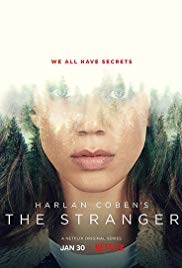Character versus plot
 I recently watched The Stranger on Netflix (based on Harlan Coben’s novel of the same name). It was certainly gripping. I watched one of the eight episodes a night and I really wanted to know what had happened to the woman who went missing at the beginning. There was a lot of excellent acting and exciting cliff-hangers and yet and yet . . . in the end I felt disappointed. There were several plot strands – too many perhaps – and the attempt to tie them all together wasn’t altogether successful. But the real problem was that two of the main characters behaved so implausibly at the end. Nothing in their earlier behaviour had prepared the viewer for their unethical actions (have to say, too, that even the most rudimentary police investigation would have revealed some pretty large discrepancies). In other words, plot trumped character and as a result the ending for me was weak.
I recently watched The Stranger on Netflix (based on Harlan Coben’s novel of the same name). It was certainly gripping. I watched one of the eight episodes a night and I really wanted to know what had happened to the woman who went missing at the beginning. There was a lot of excellent acting and exciting cliff-hangers and yet and yet . . . in the end I felt disappointed. There were several plot strands – too many perhaps – and the attempt to tie them all together wasn’t altogether successful. But the real problem was that two of the main characters behaved so implausibly at the end. Nothing in their earlier behaviour had prepared the viewer for their unethical actions (have to say, too, that even the most rudimentary police investigation would have revealed some pretty large discrepancies). In other words, plot trumped character and as a result the ending for me was weak.
It got me thinking about the importance of character. Yes, plot is important in crime fiction, but ideally plot should spring out of character and when it doesn’t, I find myself losing interest or wanting to throw the book across the room, shouting, ‘they just wouldn’t have done that!’ It is one of the hardest things to get right, and I have spent many hours trying to work how I can get my characters to do what I want them to do without provoking that kind of response in my readers. When we think of the books that we love, isn’t it so often the characters that stay with us, however startling or original the plot?
4 Comments
Margot Kinberg
February 26, 2020I couldn’t agree more, Christine. I feel especially strongly that way about characters who don’t behave consistently or believably. If I invest myself in a story, so that I care what happens to a character (or to characters), I want to believe that those characters could exist. If they don’t behave the way real people likely would, this takes me out of a story. Then, it doesn’t matter what the plot was, as I’m no longer engaged. Of course, plot matters too, and I do much prefer a plot where the threads are woven together, and where the events are plausible. But without credible characters, I just don’t get as invested.
Christine Poulson
February 26, 2020Good to know that you feel the same way, Margot. I think the very best crime novels are a perfect melding of character and plot. Of course in the novel that the series was based on, the protagonists might have acted in ways that prepared us for their choices at the end.
Moira@Clothes in Books
February 28, 2020According to Martin Amis, his father Kingsley used to comment out loud while reading books: ‘no you didn’t say that’ ‘no that’s wrong’ ‘I don’t believe you’ about what he considered mistakes in characters’ actions. I warmed to him, because I often feel like that, just as you describe.
Harlan Coben I think does one thing very very well: invent setups which you desperately want to know the explanation for, and then add twists over and over in the final section. The last few twists are completely unconvincing and impossible, but he has kept you going. I can only read one of his at a time (in the sense that I don’t want to read another one immediately), but I do read one every few years! Fair play to him, he was doing this long before the current fad for ‘twists’ which are the main plugging point for so many modern crime novels.
Christine Poulson
February 29, 2020I think you are spot on about Harlan Coben. Yes, gripping, and he knows how to keep you reading, but somehow unsatisfying in end and they’re not the kind of crime novels you want to reread – unlike Margery Allingham, Dorothy L Sayers et al.
While I am talking to you – I now can’t comment on your blog via my iPad either!